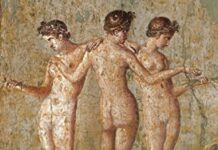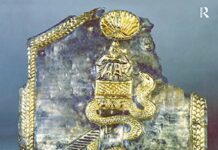
Ebook Info
- Published: 2011
- Number of pages: 477 pages
- Format: PDF
- File Size: 36.46 MB
- Authors: Michael Grant
Description
Myths of the Greeks and Romans is an essential guide to ancient literatureThe myths told by the Greeks and Romans are as important as their history for our understanding of what they believed, thought and felt, and of what they expressed in writing and visual art. Mythology was inextricably interwoven with the entire fabric of their public and private lives.This book discusses not only the purely fictional myths, fairy-tales and folk-tales but the sagas and legends which have some historical grounding. This is not a dictionary of stories, rather a personal selection of the most important and memorable. Michael Grant re-tells these marvellous tales, and then explores the different ways in which they have appeared throughout literature. It is an inspiring study, filled with quotations from literary sources, which gives the reader a fascinating exposition of ancient culture as well as an understanding of how vital the classical world has been in shaping the western culture of today.
User’s Reviews
Reviews from Amazon users which were colected at the time this book was published on the website:
⭐As important as almost any literature is in understanding Western culture are the tales of Greek and Roman mythology. Unlike Shakespeare, Chaucer or Cervantes, however, these stories are not identified with a single author, but rather a number of big names, including Sophocles, Aeschylus, Euripides, Livy, Ovid and most notably (and perhaps most legendary), Homer. These stories have endured for millennia, and have been related by a number of authors over the years. Michael Grant is walking over familiar ground with his book on these myths, but he still is able to provide a new look at these old stories.Grant, an author on numerous books on ancient history (particularly Greek and Roman, but also other Mediterranean communities), definitely has the credentials to write about these stories. The myths themselves are actually just the starting point in his discussion; what follows after the tales is an analysis of the impact of the story.An example would be the story of Oedipus, in particular, Sophocles play, King Oedipus (also known as Oedipus Rex). First Grant tells the story in a rather straightforward narrative with occasional interruptions where he provides excerpts from translations. He then discusses some of the history behind Oedipus and some of the thematic issues: for example, why is Oedipus punished for a fate beyond his control? Grant also discusses Freud and the Oedipus Complex.What’s important to Grant is that these myths are not mere entertainments, but instead have a depths and breadth that goes well beyond the actual tale. All the well-known tales are discussed: the Iliad and the Odyssey, Jason and the Argonauts, Perseus, Aeneas, Romulus and Remus, and many others. What is sad is the amount of material that has been lost to the ages, such as most of the plays of Sophocles and Aeschylus, or the lost parts of the grand Trojan War epic of which the Iliad and Odyssey were only a part.While Grant can sometimes be a little tedious in his histories, he is in top form with this book. I would not recommend this book as an introduction to these myths (as storytelling is not Grant’s primary objective), but if you know them already, this book is great: it’ll give you a fresh, insightful look into these classic stories.
⭐At 4.2″ x 6.75″ (+/-) it is the same… I was (mistakenly) thinking that as a hard cover it would be larger with better pictures & more room for notes, marginalia & highlighting… Also it takes a paper weight to make it lie open… rsj
⭐My niece was studying Homer in 9th grade and I thought Professor Grant’s insights might be helpful. Also a good introduction to basic mythology: Cupid and Psyche, Pyramus and Thisbe…the list goes on and on.
⭐Pretty good overview with haphazard but welcome connections from all over literary history. Unfortunately, my copy cuts off at page 368, leaving out some 50 pages of chapter 17, maps, notes, and the index which are all listed in the table of contents.
⭐Great Book !!
⭐I bought this book while searching for a summary of up-to-date points of view on the Greek myths, but “Myths of the Greeks and Romans”, first published in 1962, is no such thing. (Note that although the listing here says that this edition is “revised and updated”, according to the title page only the bibliography has been updated.) It sorely feels the lack of half a century of archaeological and historical research, and of theoretical and literary perspectives. This is a pity, because the conception of the book, as a way of organizing the vastness of its material, is a good one: choose a number of ancient literary sources, summarize a myth or myth-cycle taken from each one, and discuss the history, background, alternate versions, and continuing literary legacy of that myth.Grant finds opportunities at various points in these discussions to introduce the layperson to an array of the theories that had been applied to myth by the mid-twentieth century: the aetiological, the ethnological, the psychoanalytic, the search for traces of history, various poetic theories, and so forth. (Incidentally, the book entirely omits footnotes for the scholars and works mentioned, and most of them are not even in the bibliography; though I realize that this is a conscious decision to avoid intimidating lay readers, I think it’s a poor one.) Grant’s eminently sensible insistence that “no single theory, however valuably suggestive, will suffice to explain the whole range of Greek and Roman mythology, or even a major proportion of its content” leads to some good passages, such as the section of the chapter on Demeter where his discussion of the relation between ritual and myth presents arguments for the primacy of the one and the other and points out that it’s not necessary to choose between them. I also was impressed by his discussion of tragedy, from “Agamemnon” to the “Bacchae”.Nonetheless, in a number of chapters, he doesn’t quite succeed in subsuming the work of other scholars into a well-constructed, comprehensible organization. Furthermore, his summaries of literary works are written with mediocre style themselves, and his work is full of a certain mid-century stodginess; his praises of the universal qualities of the myths come from a cultural perspective just different enough from mine to make it obvious that he’s mistaken in what he thinks is universal. Perhaps no suitable replacement for this good, but far from perfect, book has yet been written; but I hope it has.
⭐The book is a treasure, it was printed in 1962 but is in good condition, OK, the dust cover is tatty, but the book itself is in prime condition.I love this idea of “rescue books” from colleges and libraries, which provides a rich source of classic books at very reasonable price.It arrived on time and inside was an apology from anybookltd, regarding the dust cover (which I always remove when reading).Anyway, just wanted to say that I was very happy to get this book and that the service was great
⭐Great book!
⭐Bought this as a gift for a family friend – they seem very pleased with it!
Keywords
Free Download Myths Of The Greeks And Romans in PDF format
Myths Of The Greeks And Romans PDF Free Download
Download Myths Of The Greeks And Romans 2011 PDF Free
Myths Of The Greeks And Romans 2011 PDF Free Download
Download Myths Of The Greeks And Romans PDF
Free Download Ebook Myths Of The Greeks And Romans



